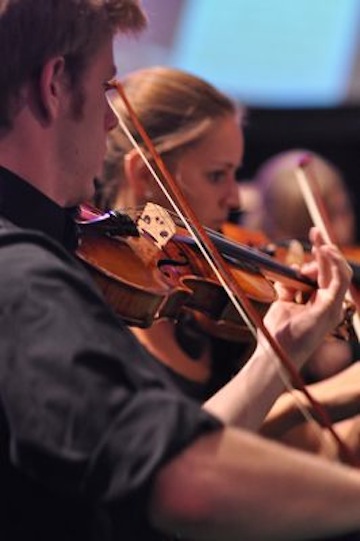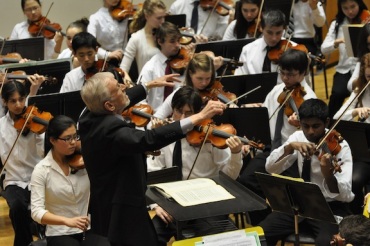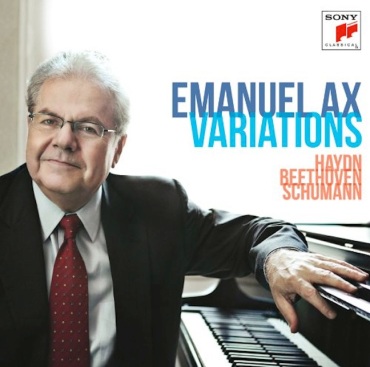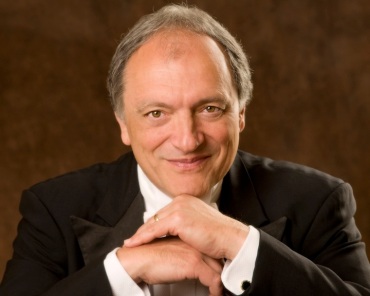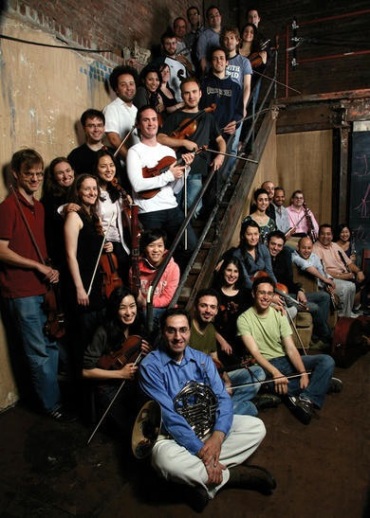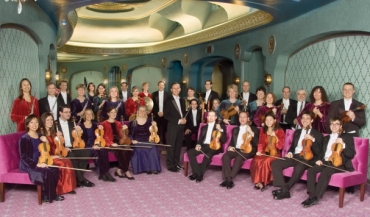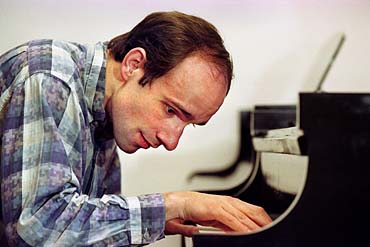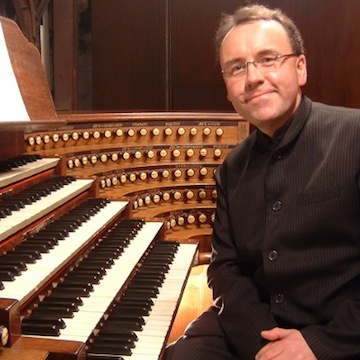The Well-Tempered Ear
Classical music: Easter is a great time to hear new versions of the Passion and Resurrection of Jesus Christ as well as the old favorites. Listen to some Bach, Mahler and Osvaldo Golijov to mark the religious holiday. Plus, on Monday night, the Gustavus Adolphus College Orchestra performs Mozart and Rimsky-Korsakov at St. Luke’s Lutheran Church in Middleton.
4 Comments
ALERTS: Tomorrow, on Monday, April 1,at 8:30 p.m. and also on Tuesday at 8:30 p.m. in short concerts in Morphy Hall, the works of student composers at the UW-Madison will be performed. The concert is free and open to the public. Also, on Monday night at 7 p.m., the student orchestra (below) from Gustavus Adolphus College in St. Peter, Minn., will perform at St. Luke’s (NOT Mark’s as I mistakenly wrote at first) Lutheran Church in Middleton. The group, which has toured four continents and played on NPR’s “All Things Considered,” will perform the Overture to Mozart‘s opera “Cosi Fan Tutte,” the first movement of Mozart’s “Sinfonia Concertante” for violin and viola; and Rimsky-Korsakov’s “Scheherazade.” Admission is a free-will offering.
By Jacob Stockinger
Today, Sunday, March 31, is Easter, the day that marks the resurrection of Jesus from death after his Crucifixion on Good Friday. (Below is a 1635 depiction of the Crucifixion by Rembrandt)
As always, it is a great time to acknowledge and listen to the great music that has been written with the highest Christian holiday as inspiration.
That can mean of course Johann Sebastian Bach and his Cantatas and Passions (below is the Passion Chorale from Bach’s “St. Matthew Passion”) as well as the B Minor Mass.
Appropriate music for Easter can also mean other composers from other periods from Mozart and Haydn in the Classical era to Liszt and Dvorak, Wagner and Mahler (below in a YouTube video is the final movement from Mahler’s Symphony No. 2 “Resurrection”), in the Romantic era to an early modernist like Francis Poulenc. And of course there is much more in all eras, especially the pre-Baroque.
Or course most, if not all, the religiously themed works were done by composers who were Christian or who converted to Christianity.
But when it comes to more contemporary works, especially by non-Christian composers, one can get stuck or baffled.
So some recent postings on National Public Radio (NPR) about the Jewish Argentinian composer Osvaldo Golijov (below) and his “Passion According to St. Mark” (at bottom) is all the more timely and informative.
Here is an interview NPR did with the celebrated and popular contemporary composer:
And here is a link to 5 excerpts from other memorable Passion music that NPR’s blog “Deceptive Cadence” featured on Good Friday:
And finally here is a link a short interview with Golijov about the work plus a complete performance of Golijov’s work that was performed in Carnegie Hall and can be heard by streaming through the famed radio station WQXR-FM in New York City:
http://www.npr.org/event/music/173635212/carnegie-hall-live-golijovs-st-mark-passion
Happening listening.
I wish a Happy and Joyous Easter to all of you who celebrate it.
What is your preferred classical music to listen to on this important religious holiday?
Tags: Carnegie Hall, Dvorak, Easter, Franz Liszt, Good Friday, Gustav Mahler, Gustavus Adolphus College, Johann Sebastian Bach, Lutheran, Middleton, New York City, Nikolai Rimsky-Korsakov, NPR, Osvaldo Golijov, Passion, Resurrection of Jesus, Richard Wagner, Wisconsin, Wolfgang Amadeus Mozart, WQXR-FM, YouTube
Classical music: Could Yuja Wang be a case of early burnout or overexposure? I doubt it. So where in the world is she? What is she playing? What is she doing? What is she recording? And what is she wearing?
31 Comments
By Jacob Stockinger
For a while there, about a year ago, the young Chinese-born and American-trained pianist Yuja Wang (below) was setting the classical world on fire. She is very exciting, as you can see at the bottom in a YouTube video.
With four Deutsche Grammophon recordings to her credit, the photogenic and virtuosic young Wang, now 26, also had garnered two Grammy nominations.
Her Carnegie Hall debut (below) got a rave review from Anthony Tommasini, the choosy senior critic for The New York Times:
And she also gave the Times a great interview:
And Wang’s penchant for sexy concert attire – either the red micro-skirt (below top) at the Hollywood Bowl or the slit-thigh black gown (bottom) at Carnegie Hall – had stirred comments and controversy.
So I recently wondered what Yuja Wang was up to.
I searched for news, and found precious little except for a rave review of her recent solo recital debut last Sunday in Los Angeles’ Walt Disney Hall:
I also checked out her website (www.yujawang.com) — it seems quite out of date — and found nothing later than her going to Mumbai, India to dedicate a new Steinway concert grand. That old news! Two years old!
I also found nothing about her next recording project, although I suspect it will be Prokofiev’s Piano Concerto No. 3 coupled maybe with Rachmaninoff’s Concerto No. 3. (After a fine recording of two Rachmaninoff Concertos with Claudio Abbado, she put out “Fantasia,”an album of miniatures and encores that I was not so thrilled about. Below is a link to my review.)
So at my wit’s end, I am putting out a call to all readers:
DO ANY OF YOU HAVE UPDATES ABOUT YUJA WANG?
HAVE YOU HEARD HER PLAY LIVE LATELY?
WHERE IS SHE?
WHAT IS SHE DOING?
WHAT IS PLAYING?
WHAT IS SHE RECORDING?
AND WHAT IS SHE WEARING?
Yuja Wang is far too talented to fall off the radar. So …
The Ear wants to hear.
Classical music education: Wisconsin Youth Symphony Orchestras (WYSO) names Michelle Kaebisch, of the Madison Symphony Orchestra, as the successor to retiring conductor Tom Buchhauser.
5 Comments
By Jacob Stockinger
The Ear has received the following press release and news announcement:
“Michelle Kaebisch will step into the role of Philharmonia Orchestra Conductor, a position held for the past 30 years by longtime Madison music educator Tom Buchhauser (below), who is retiring at the end of this school year.
“Kaebisch (below, in a photo by Katrin Talbot) brings with her a wealth of experience in the music world, having served as Director of Education and Community Engagement at the Madison Symphony Orchestra (MSO) since 2006, and as a violinist in the MSO since 1993.
“She holds a BS degree in Instrumental Music Education from the University of Wisconsin-Madison and taught high school orchestra and beginning strings in the Stoughton Area School District from 1995 to 2006. She also received a nomination from the Walt Disney Company’s public service branch as DisneyHand Teacher of the Year in 2006, recognizing her creativity in the classroom.
“Kaebisch’s book, “HeartStrings: A Guide to Music Therapy-Informed Engagement for Symphony Orchestras,” published in January 2012, has been purchased by orchestras and healthcare facilities world-wide, including Carnegie Hall’s Weill Music Institute, Pittsburgh Symphony Orchestra, and the Arts & Medicine Institute at Cleveland Clinic.
“She has led presentations at the League of American Orchestras and Society for the Arts in Healthcare annual conferences, and will be the keynote speaker at the 2013 Association of Wisconsin Orchestras bi-annual conference. Kaebisch is co-chair of the League of American Orchestras’ Education and Community Engagement Committee and has been active with the Wisconsin School Music Association on the Middle and High School Honors Project staff.
“Kaebisch has served as a conductor for the UW-Madison Summer Music Clinic, the UW-Whitewater Strings Camp, and the Badger Conference Honors Orchestra.” (Below are photos of a packed MSO student concert (at top, by Greg Anderson) and WYSO’s Philharmonia Orchestra, at bottom by Cheng-Wei Wu).
“WYSO’s Executive Director Bridget Fraser said: “I am thrilled that Michelle has accepted the position. She is an exceptionally well-qualified conductor with a passion for music education. I know she will make a tremendous difference in the artistic lives of the Philharmonia Orchestra’s young musicians.”
Kaebsisch has told The Ear that she will continue her post at the MSO as Director of Education and Community Engagement, but is taking a leave of absence from her duties as a violinist in the orchestra until she sees how MSO and WYSO schedules work out. (Below is a link explaning her “on-call” duties as an MSO ambassador to classrooms plus of photo of her plyaing for children.)
http://www.madisonsymphony.org/oncall
And at bottom is a YouTube video of the Philharmonia Orchestra in WYSO performing “Greensleeves” under outgoing conductor Tom Buchhauser:
Classical music: Here are three notable new solo piano releases from Madison-connected pianists — Emanuel Ax, Alessio Bax and Jonathan Biss.
3 Comments
By Jacob Stockinger
A New York Times critic recently asked about veteran pianist Emanuel Ax (below): Does this guy ever have an off night? And the answer was no.
Ax, a longtime favorite to Madison audiences ever since he first played here in 1975, is indeed one of the most reliable, consistent and reputable pianists on the circuit these days.
He has technique to spare but he is not known for, or given to, pyrotechnics. No one raves about his octave technique, his huge sound, his fast scales.
But he is known for a certain distinctive and appealing tone and a light touch. More importantly, he is known for always doing justice to the music, not himself, and for favoring naturalness over edginess.
You can hear all this and more – Ax at his best — in his new release for Sony Classical. It is based on the program of theme-and-variations he is now touring with. The CD features Haydn’s “Variations in F Minor,” Beethoven’s “Eroica” Variations and Robert Schumann’s “Symphonic Etudes,” in that order. If you get the digital download from iTunes, you can also get Aaron Copland’s Variations that just didn’t fit on the CD but are part of the original program.
All the performance are noteworthy and convincing. But I am especially fond of the Haydn work, which was written, legend has it, at the death of a student who was also the composer’s lover. Ax brings both Classical-era poise and clarity touched with a proto-Romantic sensibility of anguish to this work that is not heard or performed often enough.
The Beethoven variations go back to his early career and he does full justice to it with added subtlety the decades have brought. And the Schumann, which includes some of the posthumous etude variations, are also thoroughly enjoyable.
I have listened to this recording several times and always find new things to appreciate. Here’s hoping he returns soon to Madison, a city The Ear knows that Ax really likes (he has performed several times with the Madison Symphony Orchestra and given several recitals at the Wisconsin Union Theater) and a city that helped give him his start.
Jonathan Biss (below) is more than a generation younger than Ax, but he is developing a reputation much like Ax’s. Biss, who performed Mozart concerto sublimely with the Madison Symphony Orchestra several season ago, likes to offer distinctive programs (lately he is combining Schuman and Janacek by interspersing them) and is known more for musicianship than showmanship. But he often shows more edginess, especially with faster tempi. Not for nothing does Biss so identify with the music of Schumann, one of his specialties.
His second volume of the complete Beethoven Sonatas for Onyx – to be completed over 10 years – often some surprises as well as some predictable qualities.
Yes, it contains the overplayed “Moonlight” Sonata, which, as the recently deceased pianist-musicologist Charles Rosen once remarked, is probably the best-known piece of art music ever written. But Biss turns in a fine, outstanding performance, and then some — although I personally miss the mesmerizing slowness of Vladimir Horowitz’ opening movement, even if Beethoven indicated he wanted it played faster.
But the real interest on this new CD is elsewhere. Start with the early but very big Op. 7 Sonata – another piece that is not played often enough, but which boasts many wonderful moments throughout but especially in the slow movement. Biss is superb in it and makes we want to play it as well as listen to it more. That is high praise, perhaps the highest praise.
Then add in such rarities as the later and relatively short Op. 78 sonata, one Beethoven was said to favor over the “Moonlight” plus the rarely heard G Minor Fantasy, which Biss recorded before for EMI and which is a quirky piece that some think belongs with the Op. 78 sonata.
I like that Biss follows his habit of mixing up the sonatas by drawing from different periods, and it continues to work well. And if you are going to listen to the “Moonlight,” you can’t do better than his version within this context. All that, plus Onyx’s sound is a clear and close-up without being harsh – just superb as ever as a model for other labels.
I just hope Biss returns soon to Madison for a solo recital or a chamber music program, or even, yes, another concerto.
The young and camera-friendly Alessio Bax (below) won the prestigious Leeds Competition and several others. He has played both a solo recital and a duo program with his pianist wife Lucille Chung in Madison at Farley’s House of Pianos. He has developed quite the reputation with high praise heaped particularly on his technique as well as some unusual repertoire, including his recording of Bach transcriptions.
When you hear his new CD of Brahms for Signum Classics, you will understand why. For beautiful music, there are the Op. 10 Ballades and the eight Op. 76 pieces and intermezzi. But for sheer breath-taking virtuosity it is hard to beat the “Paganini” Variations, which he performs to perfection, bringing the music rather than his technical prowess to the fore. An added piece of razzle-dazzle is Gyorgy Cziffra’s arrangement of Brahms’ Hungarian Dance No. 5 (see and hear it performed live by Bax in a YouTube video at the bottom).
But Bax also possess great tone, and a wonderful sense of line and lyrical pacing that allow the thickly scored Brahms miniatures to breathe and make sense. He should definitely return soon to Mad City.
I myself like more mixed recital programs like Ax’s, ones built around a central theme or a connection that puts pieces and composers into dialogue with and among each other. And I think that labels are turning more and more to such programs as many buyers and listeners already own compete cycles of certain works by certain composers.
All in all, these new releases bodes well for a new generation of pianists who impress us with their musicianship as well as their technique, but who are still not well enough known to the public. And The Ear says it again: May Emanuel Ax, Jonathan Biss and Alessio Bax all return soon to Madison for recitals, concertos or even chamber music.
Tags: Aaron Copland, Alessio Bax, Beethoven, Biss, Compact Disc, Emanuel Ax, iTunes, Jacob Stockinger, Johannes Brahms, Jonathan Biss, Ludwig van Beethoven, Madison, Madison Symphony Orchestra, New York Times, Onyx, Piano, Robert Schumann, Signum Classics, Sony Classical, Wisconsin Union Theater, YouTube
Classical music: Madison Symphony Orchestra’s maestro John DeMain looks back with pride on 20 years and forward with gratitude to many more years in Madison as long as the city wants him and he remains physically capable of the job.
Leave a Comment
By Jacob Stockinger
You may recall that last week the Madison Symphony Orchestra (below) announced its next season, 2013-14, which is special because it marks the 20th year of the tenure of music director and conductor John DeMain.
Here are links to the MSO website and to this blog’s announcement of the MSO’s new season:
http://madisonsymphony.org/13-14
The season announcement by DeMain and his administrative team took place over lunch. It was on a cold rainy day in the light-filled rooftop restaurant Al Fresco, located in the Madison Museum of Contemporary Art, which is also located in the Overture Center where the MSO regularly performs in Overture Hall.
Looking trim and fit, DeMain gave an articulate, humorous and informative introduction to the upcoming season, even though he had just had just had a very busy week that included three subscription concerts, a sold-out morning of children’s concerts and the sold-out Final Forte teenage concerto competition that was broadcast live over Wisconsin Public Television and Wisconsin Public Radio:
After a lunch of Chicken and Caesar salad dressing wraps and green salad, the gregarious and amiable DeMain opened up the session to informal questions.
The Ear asked DeMain (below in a photo by Greg Anderson) to reflect on the last 20 years and what he made of it, and to look forward to his future in Madison – especially since the average tenure of a conductor is around 10 years.
Well first of all, I think that 10-year tenure rule is true for large, major 52-week orchestras. But for orchestras of this size, I think communities of this size don’t like to see too much change if they don’t have to. And there are always exceptions even at the big orchestras.
How would I sum up my 20 years here? Obviously, I am thrilled that during my tenure we went from two to three performances (triples) of each concert and that we got the Overture Center (below), which is such a great home in which to make music and opera. Both the musicians and I so love being in this home. The hall also attracts the top-notch musicians in the orchestras that I get to work with. It’s been a real high. (Below top is the Overture Center; below bottom is Overture Hall.)
center
As for repertoire, I wanted to do all the Mahler symphonies and I did. So now we are looking at still more composers that we’ve neglected and composers that we want to do more of and haven’t. But that comes in the future. Right now, we want to celebrate next season with a feast of beautiful music and use the next season to celebrate.
The great thing about music is there is so much beautiful music out there is that if you can’t do one beautiful piece, you can do another. You don’t really feel bad about it because there is a limitless choice of good music out there. You just can’t get to all you want to play when you want to play it.
I am so glad where I am in this community where there is such a love of the arts and such support for the arts. It is a heart-warming experience every time we do a subscription weekend.
I also love it when a guest soloist comes to me and says — which has happened twice in the past month -– “I’ve done this piece with such and such a major orchestra and you are already doing it better than they ever did.”
Experiencing music live is great. Take the Shostakovich 10th Symphony we just did. You see the violins take a down bow in an aggressive moment. The orchestra plays with a physical involvement that goes with the audience as well as the listening does. The audiences tell me over and over again how much they enjoy watching the orchestra play — as long as it enhances the experience of the music.
I’ve always been the kind of musician who likes being in a long-term relationship or post. I don’t particularly enjoy guesting. I was with Houston Grand Opera a long time. Now I’m here with the Madison Symphony Orchestra and Madison Opera a long time.
What I do is my brand of music-making and the next person who comes along will have their way of making music. But by staying on, you have a chance to develop. By being here a long time you have a chance to raise the bar and set a high standard just by being here and not being away all the time and running around. I like the idea of growing and maturing with the orchestra during these years and having a beautiful home.
Barring the unforeseen, I certainly expect to be here to celebrate my 25th anniversary and from then on we will see. One doesn’t think about age except maybe when looking in the mirror. But if your ears are OK and your eyes are OK and your arms are OK, making music is lifelong experience. I don’t think it has a timeline to it. We know that. Just look at Lorin Maazel, who is still conducting at 83. There is no real time line there unless you just can’t do it.
Here is John DeMain on TV, NBC 15, talking about a 2011 MSO concert featuring local UW-Madison pianist Christopher Taylor. You can find many more John DeMain videos on YouTube.
Classical music: Being a professional classical musician takes more than having talent, good stage nerves and the ability to play the right notes.
6 Comments
By Jacob Stockinger
Spring break has begun at the University of Wisconsin-Madison and at most public schools in and around Madison.
That means that the active concert life at the UW and other local presenters has taken a short break or intermission.
And that, in turn, means that I can catch up on some things – comments, reviews, non-local stories – that got pushed aside to make way for the ever busier schedule of live classical music events in the Madison area.
One of the things that I meant to blog about earlier is the lesson that I received from a couple of outstanding local events: The lesson that it takes more than talent, good stage nerves and playing the right notes to make a professional career in music.
One similar expression of that came recently from a blog by pianist Stephen Hough (below), who has performed several time sin Madison, from his comments about his life between concerts and from comments by his readers. Here is a link:
http://blogs.telegraph.co.uk/culture/stephenhough/100068438/solitude-among-the-phantom-nuances/
And you can Google to find other stories about life behind the scenes for concert musicians. That was one reason the recent movies “A Late Quartet” (below) and “Quartet” were so enjoyable.
I also posted about this when the acclaimed pianist Jeremy Denk. (Denk, below) returns to Madison on April 11 to perform Bartok, Liszt, Bach and Beethoven in a Mills Hall recital for the Wisconsin Union Theater series.)
Denk came here and lectured at the UW School of Music, gave a blog panel, and performed a massive recital of Charles Ives and J.S. Bach’s “Goldberg” Variations at the Wisconsin Union Theater two seasons ago. He performed this despite having his computer, with many notes for his acclaimed blog (“Think Denk”) and terrific lectures, stolen from backstage.
But Denk gamely went on as of nothing happened and delivered the goods in spades. I don’t know if I could have summoned that kind of concentration after that kind of upsetment. In fact, I am almost certain I could NOT have.
This semester I can think of two other examples, although I am sure there are more I don’t know about.
On Feb. 9 the acclaimed and unconventional Brooklyn-based freelance chamber orchestra The Knights (below) and pipa virtuoso Wu Man played an outstanding concert (below) marking the Chinese New Year in Mills Hall for the Wisconsin Union Theater, which is closed for renovation.
Yet they arrived only 70 minutes before they went on stage.
They had unexpectedly caught a last-minute flight out of New York, despite a snowstorm (or snow “event” as TV weather forecasters have taken to calling it) and went to Milwaukee, where a chartered bus picked them up and brought them to Madison.
But it all happened so fast and unpredictably. So unsure were things that even the presenters were making contingency plans for cancelling the event.
But they all arrived and went on stage where they stood to play Debussy, Stravinsky and Milhaud as well as a pipa concerto by American composer Lou Harrison and a pipa work composed by Wu Man. Via cell phone, the players en route had asked that cookies and milk be provided after the concert for them (they hadn’t eaten or had a chance to rest) and for the rest of the audience.
That happened, and the music combined with the socializing make for an unforgettable event.
That kind of devotion, of going with flow no matter how discouraging, is what being a professional musician is all about. No excuses were made. The Knights and Wu Man just kept their composure, put the music first and played their hearts out – and the audience, including The Ear, was most grateful and appreciative.
Also in February, the distinguished German cellist Alban Gerhardt performed a terrific and terrifically difficult Prokofiev piece (the “Sinfonia Concertante”) with the Madison Symphony Orchestra under John DeMain, who himself turned in a terrifically vital performance of Beethoven’s rarely heard Symphony No. 4.
But Gerhardt (below) too faced obstacles that turned out to be a demonstration of his cool professionalism.
Normally, he said, it takes about 12 hours to get from his home in Berlin, Germany to Madison. But he was rerouted due to airplane difficulties, and it took him twice as long –- about 24 hours – as normal.
In fact, he was late for his won first rehearsal. But he came directly from the airport and wandered into Overture Hall and picked up where someone else had started on his place. That was on Thursday night. Then came the actual performances on Friday, Saturday and Sunday -– and he performed up to the level we all expected and that had been advertised by the symphony.
But travel and fatigue weren’t the only problems.
Add in some personal heartbreak. The Transportation Security Authorities at Dulles Airport in Washington, D.C broke his $20,000 cello bow (below) in some careless manner while they inspected and then closed his cello case. He later discovered they had also damaged his cello.
The incident even made national and international news. Here are links:
http://www.wqxr.org/#!/blogs/wqxr-blog/2013/feb/12/cellists-bow-damaged/
http://www.thestrad.com/article.asp?articleid=2524
http://www.opposingviews.com/i/entertainment/tsa-damages-cellist-alban-gerhardts-20000-bow
That kind of unexpected loss has to hurt, especially when so much of the life of a touring musician is based on routine and things going as planned.
But neither the travel delay nor the broken bow – he borrowed one from a symphony cellist – interfered with his absolutely first-rate performance.
Talk about remaining cool, calm and collected!
Anyway, both concerts were wonderful events that I did not review because space was needed for other previews. (Each would have received a rave.) But I did want to praise not only the performances, but the sheer perseverance of great and thoroughly professional musicians who are anything but temperamental divas.
And then this past week, the up-and-coming New York-based pianist Shai Wosner (below) stepped in a again — the second time in three years — to substitute for Anne-Marie McDermott as a soloist with the Wisconsin Chamber Orchestra. He got the call Tuesday afternoon and by Friday night was in Madison, had rehearsed the scheduled work (Mozart’s great Piano Concerto in C Minor) and delivered a first-rate performance.
Do you know of similar stories to share with readers and non-musicians or especially amateur musicians who might reassess whether they really ever wished to be professional touring concert artists?
The Ear wants to hear.
Tags: Alban Gerhardt, Berlin, Cello, cello bow, Charles Ives, Gerhardt, Jacob Stockinger, Jeremy Denk, Johann Sebastian Bach, John DeMain, Madison, Madison Symphony Orchestra, Stephen Hough, The Knights, Transportation Security Administration, University of Wisconsin–Madison, Washington Dulles International Airport, Wisconsin Union Theater, Wu Man
Classical music: The Wisconsin Chamber Orchestra turns in a two-fold triumph with a Madison’s first live Bruckner symphony and a darkly elegant Mozart piano concerto with Shai Wosner as soloist. Moreover, the WCO plans on another Bruckner symphony (No. 2) next season.
6 Comments
By Jacob Stockinger
Is this a case of saving the best for last (or next to last) ?
Probably not, as most performing groups want to put their best foot forward all season long.
But now there can be no doubting that the smaller David took on the bigger Goliath (the Wisconsin Chamber Orchestra vs. the Madison Symphony Orchestra, though they are really friendly competitors, not enemies) for the honor of presenting live Bruckner symphonies in Madison first – and won. Moreover, the ambitious and accomplished WCO has programmed Bruckner’s Symphony No. 2 for next season while the MSO has once again taken a pass.
So some history was made, and much beauty was created at last Friday night’s concert in the Overture Center‘s Capitol Theater by the Wisconsin Chamber Orchestra (below top) under its longtime music director and conductor Andrew Sewell (below bottom).
The evening started off with the Israeli-born and now New York-based pianist Shai Wosner (below) once again substituting for a missing Anne-Marie McDermott in Mozart’s dark and dramatic masterwork the Piano Concerto No. 24 in C Minor. K. 491.
Wosner is a master of clarity, elegance and rounded tone with a great gift for playing quietly, with understatement. His scales remain strings of individual pearls — not a choker. Trained as a composer, Wosner also played his own cadenzas in the first and last movements, and provided his own variations and ornamentation in the second movement when the theme gets repeated five times.
Most of all, Wosner displayed in abundance what great Mozart concertos – which are difficult to bring off because of their transparency – require. Both Wosner and the WCO played the concerto as chamber music, holding dialogues with the various sections of the chamber orchestra.
The effect was magical and moving. It was an enthralling performance, and makes one hope to hear more of the Wosner-Sewell partnership in more Mozart piano concertos as well as other repertoire. There are, after all, 27 piano concertos by Mozart, of which at least 12 or 18 are undeniable masterpieces. And Wosner told The Ear that is looking into recording piano concertos by Haydn and Ligeti. Madison could be a test run.
The audience appreciated the Mozart performance so much that they elicited from Wosner a perfect encore: a Schubert miniature, the haunting “Hungarian Melody,” which Wosner plays on his all-Schubert CD for the Onyx label. (Below is a YouTube video with Andras Schiff playing part of it.) The audience was hushed and spellbound by the entrancing beauty played so subtly, so fluidly and so warmly.
It sure makes one hope that someone – perhaps the Wisconsin Union Theater or Farley’s House of Pianos – brings Shai Wosner back for a solo recital.
Then, after intermission, came the historic Bruckner.
This is officially his “Zero” or “Nullte” Symphony, as good a place as any to start a Bruckner quest. And once again the Wisconsin Chamber Orchestra and Sewell showed their respective talents in this long and difficult, if early, score by the deeply religious and solitary Austrian Bruckner (below):
All the sections — strings, brass, winds, percussion — performed superbly with sharp attacks and even sharper silences.
To be clear: This is certainly not Bruckner’s greatest symphonic work. But it is well worth playing and hearing, and it proved a wonderful first introduction to hearing live Bruckner symphonies in Madison.
I loved especially the first movement, with its haunting violin opening that made one wonder if the sophisticated movie composer and orchestrator Bernard Hermann had listened to it or had it in mind while he was writing the edgy score for Alfred Hitchcock’s “Psycho.”
Compare the opening minutes of the two works with the sharp, jagged violins and judge for yourselves:
The slow movement proved lovely, and the Scherzo, which looks forward and is perhaps the most Brucknerian movement, proved by turns forcefully dramatic and songfully lyrical.
All in all, this was one of the finest and most impressive pairings – of both the programming and the performances – of this season. It was on par with the outstanding concert of an early Mozart Violin Concerto and a late Shostakovich symphony that the Madison Symphony Orchestra performed only two weeks ago. Are we in Madison not lucky? One can only hope for more concerts like these two.
Of course, we are all critics. And you should know that The Ear is not alone is his very positive regard for the WCO concert with Wosner and Bruckner.
Here, for example, is the review by John W. Barker, a frequent guest blogger for this blog, that appeared in Isthmus and briefly explores the contrasts between Bruckner and Mahler, who are so often mentioned together:
http://www.thedailypage.com/daily/article.php?article=39478&sid=c7a301311ba6864c6009c653492cee4f
And here is a review by Greg Hettmansberger for the “Classically Speaking” blog he writes for Madison Magazine:
Classical music: Making music is healthy for you, researchers say. It can lower blood pressure and increase a sense of well-being. You can even start music lessons as an older adult.
7 Comments
By Jacob Stockinger
Talk about art therapy!
A close friend has often told me how the German army in World War I gave double rations to the piano players because they used so much energy doing their job of entertaining the troops.
I have never been able to prove the story. But it makes a lot of sense to this amateur pianist. I know the physicality of playing, and it takes stamina as well as finesse. And it involves both body and mind. (Below in a photo of University of Wisconsin pianist Christopher Taylor, whose playing is particularly physical and energetic, as you know well if you saw his recent astonishing recital of Franz Liszt‘s extremely virtuoso transcriptions of Beethoven’s Fourth Symphony and Fifth Symphony.)
Contemporary researchers have taken an interest in studying how music affects one’s physical and mental health as well as social well-being, especially now that researchers can track changes through MRI and CAT scans.
Here is more good news: The suggestion, or even proof, by Dutch researchers that playing music lowers stress and lowers blood pressure. (Other studies show that listening to music also has benefits. But the one I am discussing dealt specific with actual music-making.)
Here is a link to the study:
http://www.psmag.com/blogs/news-blog/playing-music-may-lower-blood-pressure-51779/
And that story has a link to another study, done in Britain, that talks about the heightened sense of well-being one gets from making music – playing the piano or some other instrument or singing. And we know that conducting is particularly aerobic and healthy. Little wonder that conductors generally live along and healthy life.
http://rsh.sagepub.com/content/133/1/36.short
The Bottom Line? Music is good and good for you.
So I say to my fellow Baby Boomers and retirees who wanted to better their health: Music lessons, anyone?
Trust me, it’s never too late.
Just look at the YouTube video below that has had more than 9 MILLION hits:
Tags: art therapy, Arts, Beethoven, Christopher Taylor, Classical music, Franz Liszt, German, Health, Jacob Stockinger, Keyboard, Ludwig van Beethoven, Magnetic resonance imaging, Mental health, Music, Music lesson, Piano, Symphony No. 5 (Beethoven), University of Wisconsin, University of Wisconsin–Madison, YouTube
Classical music: Fresco Opera Theatre of Madison brings Reality TV to the Dane County opera world tonight, Saturday and Sunday at the Overture Center. Plus, British concert organist performs on the Overture Concert Organ this Saturday night.
2 Comments
ALERT: Tomorrow, Saturday March 23, at 7:30 p.m. in Overture Hall, the Madison Symphony Orchestra will present English concert organist David Briggs (below) playing the Overture Concert Organ. Briggs specializes in orchestral transcriptions and improvising on themes submitted by the audience. His Madison program includes J.S. Bach‘s Prelude and Fugue in G Major; Haydn’s “Three Clock Pieces”; Franz Liszt’s “Prelude and Fugue on B-A-C-H“; Briggs, Variations on “Greensleeves: and Briggs, Three Transcriptions — Tchaikovsky’s “The Waltz of the Flowers,” Elgar’s ” Nimrod” from the “Enigma” Variations and Rimsky-Korsakov’s “The Flight of the Bumble-Bee.” Tickets are $19. Call the Overture Center box office at (608) 258-4141 or for more information, including tickets, visit: http://www. madisonsymphony.org/briggs.
By Jacob Stockinger
Where do Reality TV and traditional opera meet?
This weekend, the encounter will take place in the Playhouse at the Overture Center in the new production by the Madison-based Fresco Opera Theatre.
The production is called “The Real Divas of Dane County” and is the group’s version of a reality television show, but with opera singers in place of the usual misfits.
Adds a press release: “In true Fresco fashion, we present traditional opera in a non traditional way — with classic operatic arias woven into an original story line. We are really excited about this production and think it will resonate with the public.”
And here is a link to the specific arias and music – by Handel, Mozart, Rossini, Verdi, Puccini, Bizet, Johann Strauss, Wagner, Copland, Menotti and others – that will be featured:
http://www.frescooperatheatre.com/real-divas-program.html
The two-hour performances of Fresco’s Opera Theatre production of “The Real Divas of Dane County” are tonight, Friday, March 22, at 8 p.m.; Saturday night, March 23, at 8 p.m.; and Sunday afternoon, March 24, at 2 p.m. Tickets are reserved seating and are $25 with a 10% discount for groups of 10 and more. Call the Overture Center Box Office at (608) 258-4141.
For more information about this production or about Fresco Opera Theatre, here is a link to the group’s home website:
http://www.frescooperatheatre.com
Here is a description or blurb – ingeniously put in the form one of those annoying TV teasers that mixed in with commercials – about the show provided by Fresco Opera Theatre:
“This is the true story of opera singers … picked to live in a house … to have their lives taped … to find out what happens … when they exit the stage and get real.”
Adds the press release: “Fresco Opera Theatre continues to present classical opera in new and fresh ways. This time around, we dive into the “reality television” genre, with an original storyline set to classical operatic repertoire.
“Fresco Opera has all the tradition, majesty, and prestige of your traditional opera while making it fun, engaging and snarky. Rookies to the genre will be introduced to opera through this fast and approachable performance. Seasoned opera fans will see a refreshing take on the art form.
This project is made possible with support from the Dane County Cultural Affairs Commission, Madison Arts Commission, SOS, and its generous donors.
